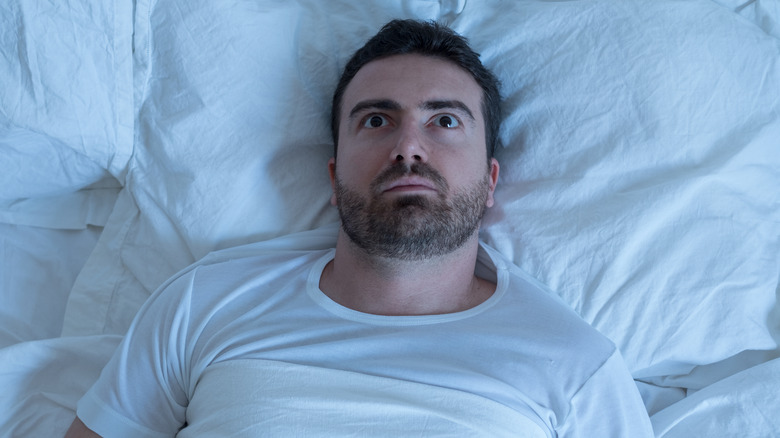What It Means When You Hear A Loud Noise Right Before Falling Asleep
You're lying in bed, on the cusp of slumber, when suddenly, the tranquility of the night is shattered by what seems like a bomb explosion, crashing cymbals, or a gunshot echoing through your mind. Your heart races, and you're jolted into alertness. It's not a dream; it's a bewildering experience known as exploding head syndrome.
Exploding head syndrome (EHS) is a medical condition characterized by the perception of loud noises during the transition to sleep or upon awakening (per Healthline). This phenomenon can be unsettling and disorienting for individuals who experience it. While EHS is not a painful condition, it can have a profound impact on an individual's quality of life. If you have experienced this, you're not alone; Mayo Clinic reports that EHS affects approximately 10% of the population, making it more common than you might expect.
It is usually harmless, but it can be frightening and disruptive to sleep. By examining the characteristics of this phenomenon along with the possible causes and coping strategies, we can gain a better understanding of this perplexing experience.
Possible causes of EHS
Experts have several theories about the causes of EHS. For instance, one prevailing theory is that stress and extreme fatigue play a role in EHS (per Healthline). These episodes often emerge during moments of heightened stress or exhaustion.
A 2020 study in Sleep Medicine Reviews proposes that EHS may result from hyperactivity in the auditory cortex, the brain region responsible for sound processing. This hyperactivity might be triggered by stress, sleep deprivation, or other factors. EHS episodes frequently manifest during the sleep-wake transition, implying potential connections to disruptions in the brain's sleep-wake cycle.
EHS often coexists with other sleep disorders like insomnia and sleep paralysis, as well as psychiatric conditions such as anxiety and depression. EHS has also been reported as a side effect of certain medications, including antidepressants and benzodiazepines. Some individuals with EHS exhibit inner ear problems (per Cleveland Clinic). Sudden shifts or disturbances in the middle ear may contribute to the perception of loud noises during sleep onset.
A 2021 report in Case Reports in Neurology reinforces the link between EHS and other sleep disorders, such as insomnia and sleep paralysis, and conditions like anxiety and depression, suggesting their potential influence on EHS development. Additionally, there is some evidence to suggest a genetic component in EHS, with reports of its occurrence within families.
What to do if you suspect you have EHS
If you think that you might be experiencing EHS, it's a good idea to keep a journal to document how often it happens, what seems to trigger it, and any other health issues or concerns that you think might be related. If you're concerned about how exploding head syndrome affects your sleep quality or overall well-being, it's important to seek the advice of a healthcare professional.
Your primary care provider may refer you to a sleep specialist or neurologist. They can conduct a medical evaluation to identify and rule out other potential underlying causes and ensure an accurate diagnosis. In some cases, they may also perform a sleep study, which is a non-invasive test that monitors your brain waves, eye movements, and other physiological parameters during sleep.
Though EHS is not typically harmful in itself, it can significantly disrupt your sleep and contribute to anxiety or stress. In cases where the episodes are particularly distressing or frequent, healthcare providers may recommend specific treatments or interventions, which can include stress management, medications, and lifestyle adjustments. By taking these steps, you can get the help you need to improve your sleep and overall quality of life.



